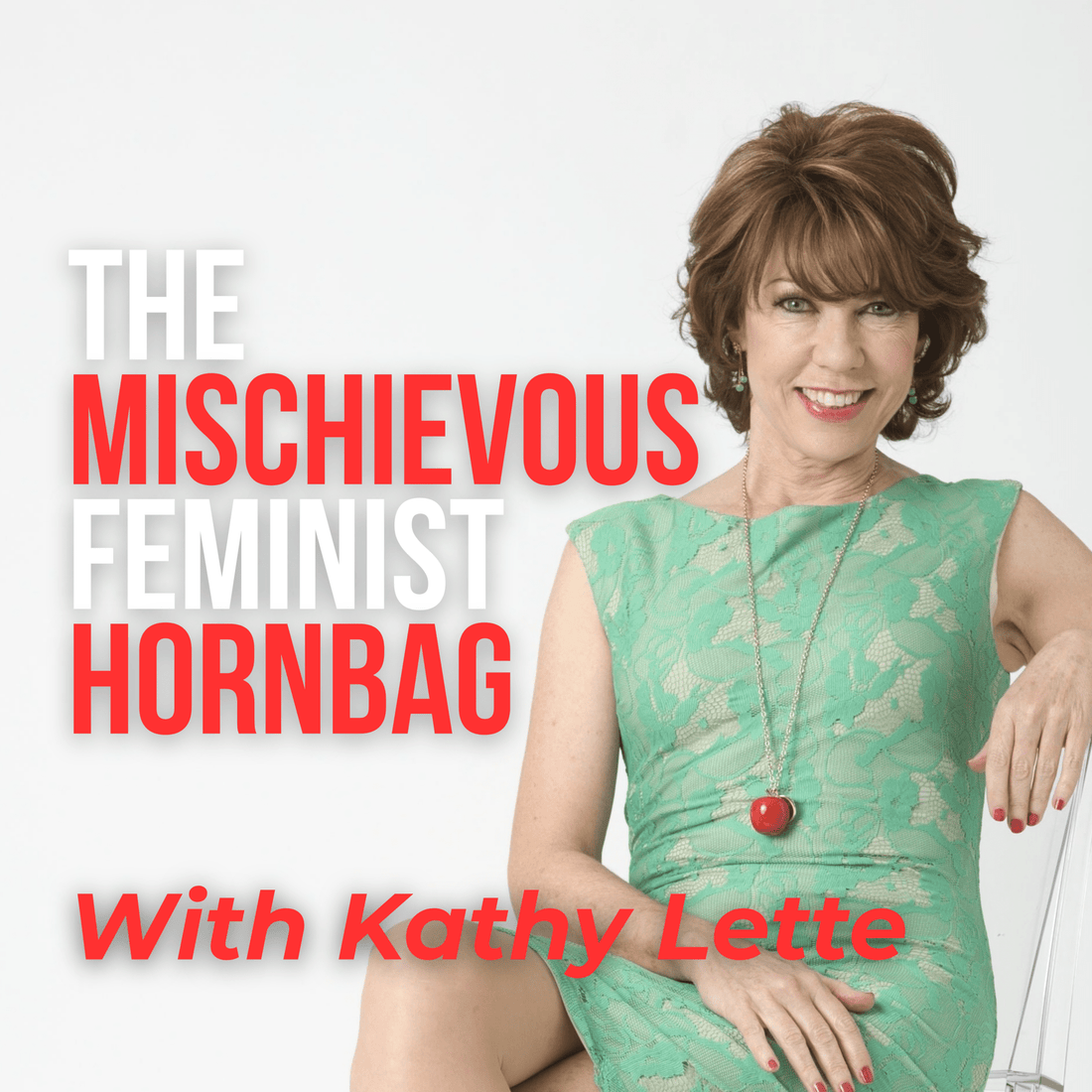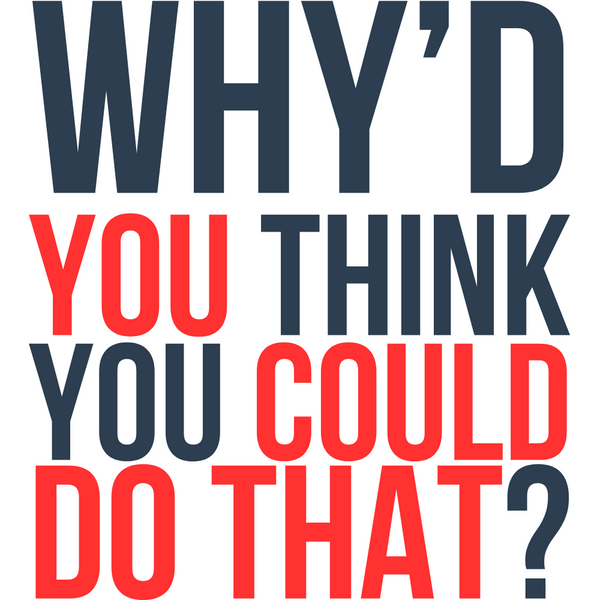
Kathy Lette: The Power of Unapologetic Truth
Share
At just seventeen, Kathy Lette co-wrote Puberty Blues — a brutally funny, taboo-smashing snapshot of surf culture that scandalised parents, got schools clutching pearls, and became a cult classic. Most teenagers would have apologised. Kathy doubled down. She turned outrage into art, shame into satire, and built a career out of making the unsayable irresistible.
This long-form feature — drawn from Kathy’s conversation with Sam Penny on Why’d You Think You Could Do That? — explores how wit can be a weapon, how honesty becomes a compass, and why the bravest thing you can do is speak your truth without asking permission.
By Sam Penny · · Read time: ~16–18 minutes
Watch the Interview



A Suburban Beginning — and a Detonation
Kathy’s origin story isn’t bohemian chaos or literary salons. It’s suburban Sydney: a teacher mum with a vocation, an engineer dad with a toolbox, and four daughters in a house that never ran out of noise. The family exported curiosity before they exported books — a year in a camper van through Europe and the United States taught the girls how to watch the world with both eyes open. School of the Air by day, life school by night.
Then came the hormones, the surf scene, and the realisation that the language used about girls was brutal. Boys were “love gods” and “stud muffins”; girls were “bush pigs”, “moles”, “glamour maggots”. The injustice was obvious even before the feminism had a reading list. Kathy did what she’s done ever since: she wrote the truth down.
Puberty Blues didn’t creep into culture; it crashed through the front door. Teenagers hid it in schoolbags. Adults tried to ban it, which is the fastest way to make a book immortal. The overnight success came with anonymous phone calls to her mum, moral panic in the pews, and a father who didn’t speak to her for a time — but still fixed her car. Love, outrage, and carburettors can co-exist.
That line is the master key to Kathy’s career. Each book is a manual she wished existed — for teenage girls, for new mums, for women navigating menopause, for parents of autistic kids. It’s public service via punchline.
Human Wonder Bras: Sisterhood as a Superpower
Kathy’s life is a case study in the physics of friendship. With three sisters, she learned early that women are each other’s suspension bridge: they carry load, absorb shock, and make it possible to cross the chasms. She calls it the “human wonder bra” — uplifting, supportive, making each other look bigger and better. When the world tried to shame teenage Kathy, the sisters closed ranks like armour. When a lesson needed learning, they were the first to laugh, then the first to help. The message for listeners is simple and subversive: bravery is a team sport.
The corollary is equally important. Many women are raised to be decorative and demure — to pull back if a man starts speaking. Sisterhood rewires that etiquette. It trains the muscle of interruption, the confidence to say what you’re actually thinking, and the grace to keep it funny so the point lands without a fistfight. If there is a recurring note in Kathy’s life, it’s this: courage is contagious at close range.
Hornbag Humour: Turning Taboo into Ammunition
Humour is Kathy’s preferred calibre. Not snark for sport — precision satire that exposes hypocrisy faster than a lecture ever could. When a TV executive bet he could make her breasts move “without touching them” and then grabbed her, she replied with a twenty-dollar wager and a well-placed kick. Was it outrageous? Absolutely. Did it reset the power dynamic? Absolutely. She got the job. The moral isn’t violence; it’s refusal. Refusal to be shamed, belittled, or trained to laugh at your own expense.
Across two dozen books, columns, and stages, Kathy shows how laughter bypasses the defensive walls people build around uncomfortable topics. Sexism, menopause, motherhood, marriage — the joke lands, the truth slips past, and suddenly we’re all talking about the thing we were raised not to mention. It’s public pedagogy with lipstick.
The Power of Unapologetic Truth
Strip away the one-liners and the celebrity, and Kathy’s work is a devotional to truth. Not truth as a cudgel; truth as a practice. The practice is simple to say and hard to do: describe the world as you actually encounter it, even if it embarrasses you, frightens you, or gets you uninvited from certain dinner tables. Do it with flair if you can. But do it.
That’s why the conversation resonates beyond literature. You don’t need to be a novelist to benefit from the discipline. You just need to be willing to stop shrinking. The workplace, the family chat, the school gate — each is a stage where you can choose candour over performance. And because Kathy’s version of truth-telling is leavened with humour, it’s not a call to arms so much as a call to wink and proceed.
Motherhood, Autism & A New Kind of Courage
When her son Jules was diagnosed with autism, it knocked the air out of the room. The stages are familiar to many parents: denial, blame, grief, Chardonnay, and finally acceptance. For years, Kathy didn’t write about it; she worried about invading his privacy. Eventually, with Jules’ blessing, she published The Boy Who Fell to Earth — not a misery memoir, but a celebration of difference, a manual for other parents, and a reminder that “normal” is just a setting on a washing machine.
Her view is both lyrical and practical. People on the spectrum, she argues, are often the garlic in life’s salad — pungent, indispensable, and transformative. The goal isn’t to iron out difference; it’s to learn how to love it, to make room for it, and to draw strength from it. That shift requires a softer bravery than public controversy. It’s the courage to be tender, patient, and endlessly inventive in the search for what works today.
Tongue-Fu at Work: One-Liners That Disarm
Kathy isn’t naïve about the office. She came of age when HR was a rumour and sexual harassment was a punchline told by the boss. You couldn’t file a form; you had to learn tongue-fu. Her advice for women (and anyone who deals with bullies) is tactical:
- Carry lines like tools. Borrow from her books if you like. You wouldn’t head bush without a knife; don’t head to a meeting without a few lines that can turn a room.
- Disarm with charm. Humour diffuses the performance of power. When you make a bully the butt of the joke, their authority shrinks to human size.
- Practise the pause. Silence is leverage. It forces others to fill it, often with honesty.
- Escalate strategically. Wit is step one, policy is step two. Document, escalate, and protect your future self.
It’s not about “winning” every exchange. It’s about refusing to participate in your own diminishment.
Becoming Un-Embarrassable: London, Class, and Thick Skin
Moving to London in the late 80s introduced Kathy to a new species: professional condescension. The accents were silky, the barbs were sharp, and Australians were “refreshing” — British for “please leave quietly”. She learned Eleanor Roosevelt’s rule: no one can make you feel inferior without your permission. So she revoked permission. Every snipe became material; every snub, a scene. Over time, the same rooms that rolled their eyes began to roll out invitations. Thick skin isn’t born, it’s built. And you build it by repeatedly refusing to bruise.
How She Writes: Wit, Rhythm, and Radical Clarity
Kathy’s style owes something to early Hemingway — spare prose, verbs that work for a living, adjectives on rations — but it’s filtered through a distinctly female comedic sensibility: confessional, cathartic, conspiratorial. She writes how women talk when men aren’t interrupting: fast, funny, and emotionally precise. The craft choices are deliberate:
- Punchlines as scalpels. The joke isn’t decoration; it’s a surgical instrument that exposes the nerve.
- Short chapters, strong cadences. Pace keeps reluctant readers moving and rewards the already-converted with momentum.
- Character as chorus. Women show up in her books as a choir: different voices, shared rhythm. It’s solidarity rendered as dialogue.
- Revenge as genre. “Poetic justice is the only true justice,” she says. The villains don’t get cancelled; they get caricatured until their power looks ridiculous.
The result is literature that sells, travels, and teaches without pretending to be homework. It’s also unusually useful: a reader can take a line from a chapter and deploy it in a corridor at 3pm. Not many novels double as personal safety devices.
Kathy’s Playbook: 10 Moves You Can Use This Week
- Say the quiet part, kindly. Don’t confuse politeness with goodness. Clear is kind; evasive is cruel.
- Borrow bravery from friends. If you can’t say it alone, say it with a sisterhood behind you. Courage compounds in groups.
- Carry a comeback. Write three one-liners on a card. Memorise them. Use them when someone strays into your dignity.
- Refuse to be shamed. If the accusation is designed to make you small, laugh — then proceed at full height.
- Turn pain into a project. If something is breaking your heart, build a resource you wish existed. It will help you first, then others.
- Optimism is a choice, not a gene. Adopt the stance that today can be moved. Then move it a centimetre.
- Ask for the crown. Men often do. You don’t get what you deserve; you get what you negotiate.
- Write it down. Put the thing you’re avoiding into a sentence. The mind respects ink.
- Be un-embarrassable. If they can’t shame you, they can’t steer you. Practise not blushing.
- Never turn down an adventure. Life is short. Pudding on the Titanic would have been worth it.
The Brave Five: Quickfire
Most unexpected reward of the career? A lobster omelette on the Savoy menu and a house cocktail — proof that cheek can climb the class system.
First emotion when Puberty Blues exploded? Awe, followed by a duck-and-cover instinct. Fame is loud; teenagers are tender.
One thing she’d do differently? Ask for more money — and a clause on the film rights. Patriarchy is expensive if you let it do the paperwork.
Mindset that mattered most? Find the funny, even when rage is closer to hand. Laughter keeps you mobile.
When did she need bravery the most? Learning to mother an autistic son far from home, with no manual except love.
Listen, Subscribe & Explore the Guest Hub
Watch the full conversation above, listen on your favourite platform, and explore more quotes, resources, and links on Kathy’s Guest Hub.
